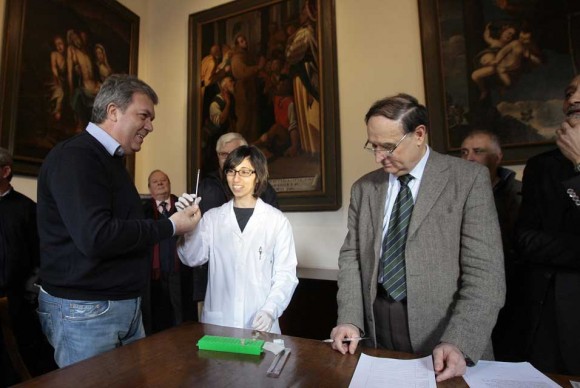Six Potential Heirs DNA Tested in Caravaggio Death Hunt
CARAVAGGIO.- Six possible descendants of Baroque artist Michelangelo Merisi, known as Caravaggio, have been DNA-tested in the hopes they can help unveil the mystery surrounding the painter’s death.
The cause of death in 1610 and the whereabouts of the corpse have always been unclear but a team of Italian anthropologists believe that what is left of Caravaggio’s body may be hidden among dozens of bodies buried in a crypt in Tuscany.
For months, the team — from the departments of Anthropology and Cultural Heritage Conservation at the universities of Ravenna and Bologna — have exhumed remains of long-buried corpses in the hope of performing a belated autopsy.

Stefano Merisi (L) takes a DNA test next to doctor Elisabetta Cilli (C) and Professor Giorgio Gruppioni from the departments of Anthropology and Cultural Heritage Conservation at the universities of Ravenna and Bologna, in the northern Italian town of Caravaggio March 8, 2010. Six possible descendants of Baroque artist Michelangelo Merisi, known as Caravaggio, have been DNA-tested in the hopes they can help unveil the mystery surrounding the painter's death. Picture taken March 8, 2010
This week they travelled to the northern town of Caravaggio, where Merisi grew up, to carry out tests with possible descendents — some of them carrying derivations of the family name. As Caravaggio died childless the team looked for the painter’s closest blood descendents in search of a match.
“We have carried out DNA tests on some individuals who have the same surname as Caravaggio, that is Merisi, and whom we think could be genetically linked to the great painter,” Professor Giorgio Grupponi said at the testing. “We’ll then proceed to compare their DNA with that of the remains.”
Caravaggio pioneered the Baroque painting technique of contrasting light and dark known as chiaroscuro. The only images of the artist available until now have been self-portraits.
He was famed for his wild life and legend has it he died on his way to Rome to seek pardon for killing a man in a brawl.
“If would be a great surprise for me if this DNA test would show a match (with Caravaggio),” Stefano Merisio, one of those being tested, said. “I have never thought about it. I have never considered this possibility. It would make me happy, surely.”
Scholars have put forward many theories about Caravaggio’s death. The most popular are that he was assassinated for religious reasons or collapsed with malaria on a deserted Tuscan beach. However, in 2001 an Italian researcher claimed to have found the painter’s death certificate, which allegedly proved that he died in hospital.
Grupponi said a timeframe and any probability for results was difficult to predict. “If we are lucky, we could hope for another two, three months to conclude our work,” he said.
As he waited for his saliva to be tested, pensioner Francesco Merisio said he would be happy to be a proven descendant of Caravaggio. “But I have no great expectations that it would change my life or give me fame,” he said.
Related posts:
